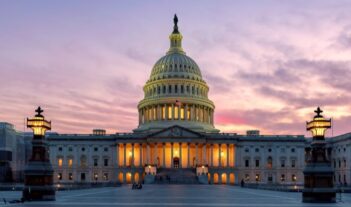
A better model for the administrative state includes both agency expertise and congressional oversight for major regulations.
In recent years, modern administrative agencies have increasingly come under attack for violating the traditional separation of powers under the U.S. Constitution. Such agencies are thought to possess too much unchecked power and to produce too much undesirable regulation. But defenders of modern agencies argue that the traditional separation of powers is not feasible in the modern world of big government. They contend that this structure does not work for big government programs that require the expertise and low-cost decision-making of modern administrative agencies.
But this defense of agencies, I argue, is mistaken. It is possible to have most of the benefits of the traditional separation of powers and still operate the large government programs of the administrative state.
To secure these benefits, one cannot rely on ordinary federal courts hearing all agency adjudications and Congress legislating regulations from scratch. Instead, expert and independent administrative courts should hear agency adjudications and Congress should decide whether to approve major regulations written by administrative agencies. This system would honor the aspects of the separation of powers that avoid a dangerous concentration of powers, but it would do so through institutions that exhibit expertise and low-cost decision-making that are the primary benefits of administrative agencies.
This institutional reform, which I defend elsewhere in a longer article, should appeal to all those who favor both checks on agencies and a large and effective government. But for classical liberals, like me, who strongly support limited government, this reform would be an obvious improvement.
At present, agencies exercise not merely the executive power of enforcing the laws, but also substantial legislative and judicial power. Congress has delegated significant authority to agencies to enact numerous regulations and to adjudicate a multitude of cases.
These departures from the traditional separation of powers are troubling. The separation of powers is based on the view that a single entity cannot be trusted to exercise largely unlimited authority. If agency officials are not checked, they can use that authority toward problematic objectives, such as pursuing extreme ideologies or promoting the interests of a political party, the bureaucracy, or concentrated groups.
The separation of powers helps to address this problematic authority. The separation of powers promotes the rule of law and limited government by helping to ensure that agencies follow existing laws and rules. It also improves the operation of agencies by improving their incentives. For example, if an agency both prosecutes and adjudicates cases, it is hard for it to be an impartial adjudicator because the agency is a judge in its own case.
It is true that agencies are presently constrained by procedures and judicial review, but agencies can normally secure the policies they desire by following the correct procedures. And although agencies are subject to judicial review, courts have given substantial deference to agencies for the great majority of their administrative actions.
Defenders of modern agencies argue that even if these departures from the separation of powers have costs, they are necessary because the expertise and expediency of modern agencies are needed to run the existing big government programs. If Congress had to adopt all regulations, and ordinary federal courts had to hear all agency adjudications, the regulations and adjudications necessary to the administrative state would be delayed, costly to complete, and decided by people without the necessary knowledge.
But Congress could establish new institutions that could operate big government programs while still largely following the separation of powers.
First, agency adjudication could be changed from a system where administrative law judge decisions are appealed to the heads of agencies to one where adjudication occurs before genuinely independent courts. These courts, which could be Article I or Article III courts, would not be subject to review by agencies. While independent, the judges of these courts would still have expertise. The judges should be required to possess expertise in either economics, medicine, or science. The judges would then be assigned cases based not on the agency from which the case arose, but on whether the case involved economics, medicine, or science.
These independent administrative courts would also decide cases quickly and cheaply. There is no reason why they could not use many of the same streamlined procedures that agencies currently employ to adjudicate cases. With these procedures and their expertise, the administrative courts should be able to exhibit the same low-cost decision-making that agencies presently do.
Second, the procedure for agency rulemakings should also be changed to a procedure similar to that in the proposed Regulations from the Executive in Need of Scrutiny Act (REINS Act). In the case of major rules—such as rules that impose an annual cost on the economy of at least $100 million—agencies should have the power only to propose major rules. Those rules would be enacted only if Congress passed them using the constitutional process for enacting laws. This would return a significant portion of the agencies’ legislative power to Congress. Some people argue that Congress would lack the time and expertise to perform this role, but that is untrue. Congress could only be required to vote upon, with very restricted debate, a manageable 50 to 100 regulations per year. Moreover, the agencies would draft the regulations, leaving to Congress the limited role of approving or disapproving them.
Although this procedure is similar to the proposed REINS Act, some reforms to the proposed Act should be made. One of the necessary reforms involves defining what constitutes a major rule. Congress, with the advice of Office of Management and Budget, should adopt a more elaborate definition of what a major rule is and how the definition should be applied. Agencies’ determinations of whether a regulation is a major rule should be reviewed, without deference, by an independent administrative court that has economic expertise.
Finally, deference to agencies should be greatly reduced or eliminated. For agency adjudications held before independent courts, there should be no deference for adjudicatory facts. For all agency actions—adjudications and rulemaking—there should be no deference for legal questions, including agency interpretation of statutes and their regulations.
Although some may argue that agencies have greater expertise on legal issues than judges do, that argument does not justify deference for legal questions. Even if agencies know more about the agency’s specific authorizing statute and regulations, judges are likely to be better at general legal tasks, such as statutory interpretation or promoting coherence in the law generally. It is not clear whether agencies will be superior to judges overall. But even if agencies are superior to judges, that superiority would have to be balanced against the additional biases of agencies that exercise executive, legislative, and judicial power at the same time. It is unlikely that any superior knowledge of agencies outweighs the greater bias that they exhibit.
In our big government world, agencies, with their expertise and low-cost decision-making, have an important role to play. But with appropriate institutional reforms, it is possible to subject agencies to a much stronger separation of powers while still enjoying the benefits of expertise and low-cost decision-making.




